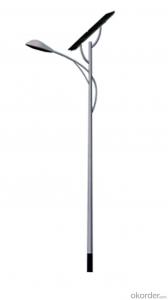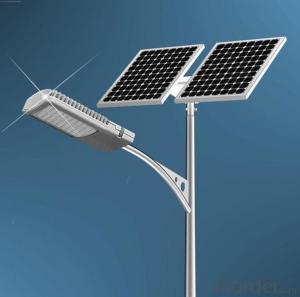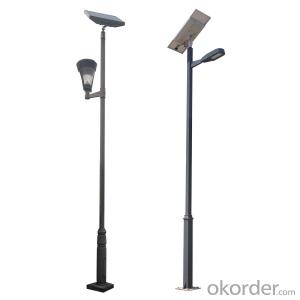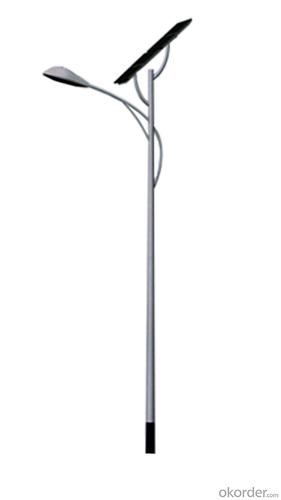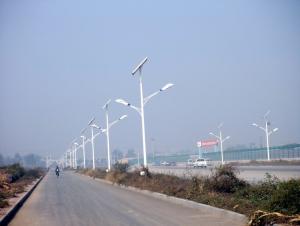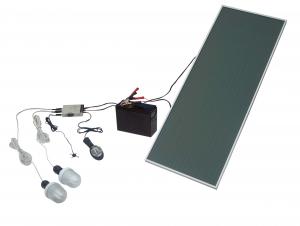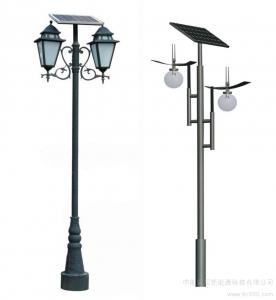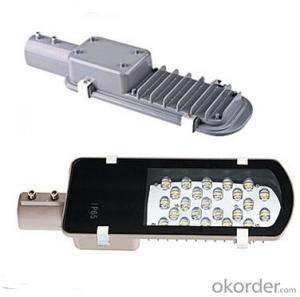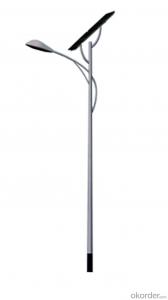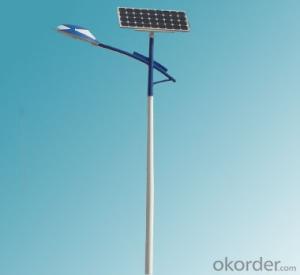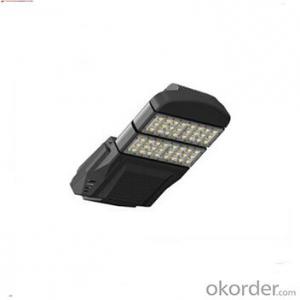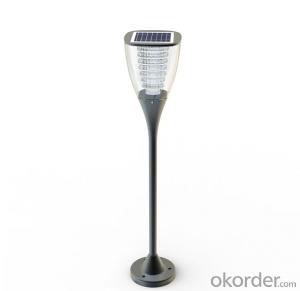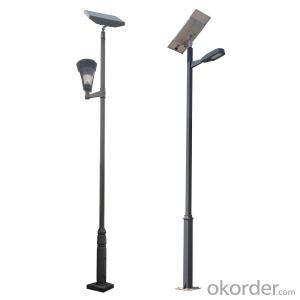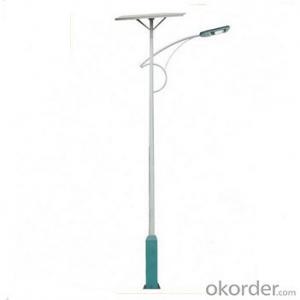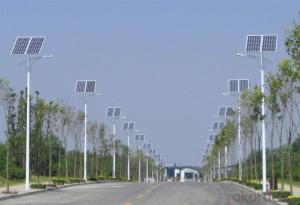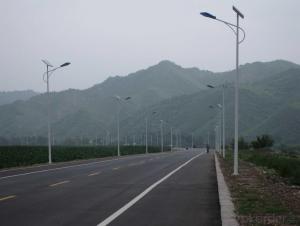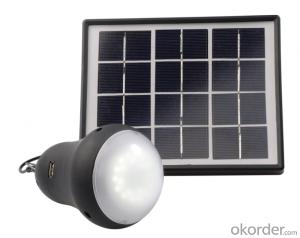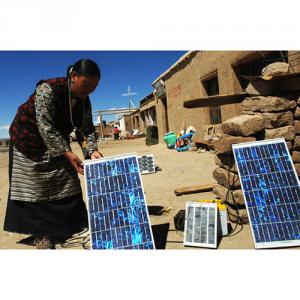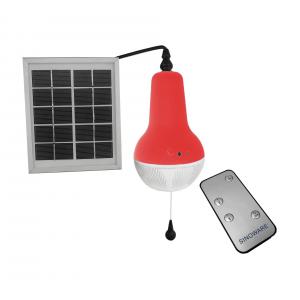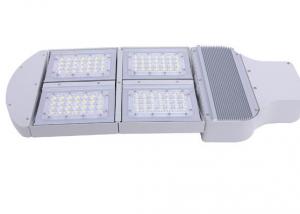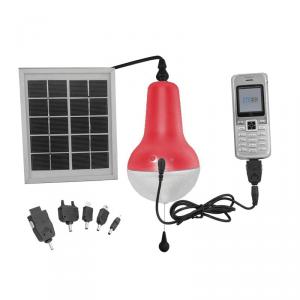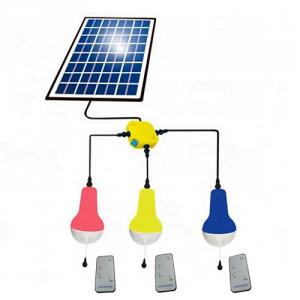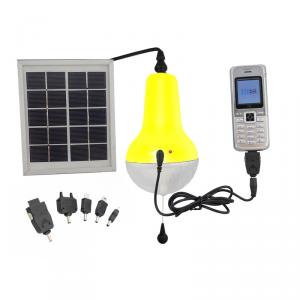Flag Pole Kit With Solar Light - Solar Street Lamps Solar Street Light Top Class Quality and High Frequency
- Loading Port:
- Ningbo
- Payment Terms:
- TT OR LC
- Min Order Qty:
- 1 set
- Supply Capability:
- 5000 set/month
OKorder Service Pledge
OKorder Financial Service
You Might Also Like
Step 1 – Find area in need of street lights
The first thing to figure out is the length of road in need of street lights. This can be a small entrance road only a couple hundred of feet long to miles of streets through an area. Does the area currently have any type of lighting available? What is the reason for needing street lights in this area?
Step 2 – Find out if electric is available
Is the electrical grid already nearby or would you need to call in the power company to bring in electrical lines? If the electric needs to be brought to the area, how much is this going to cost? Depending on how far the grid electric is from the location of the needed lighting, this can be quite expensive.
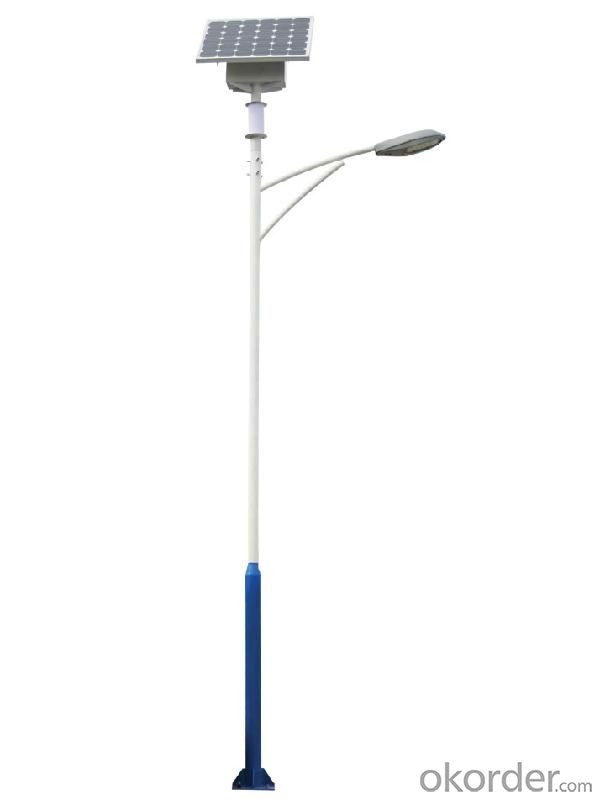
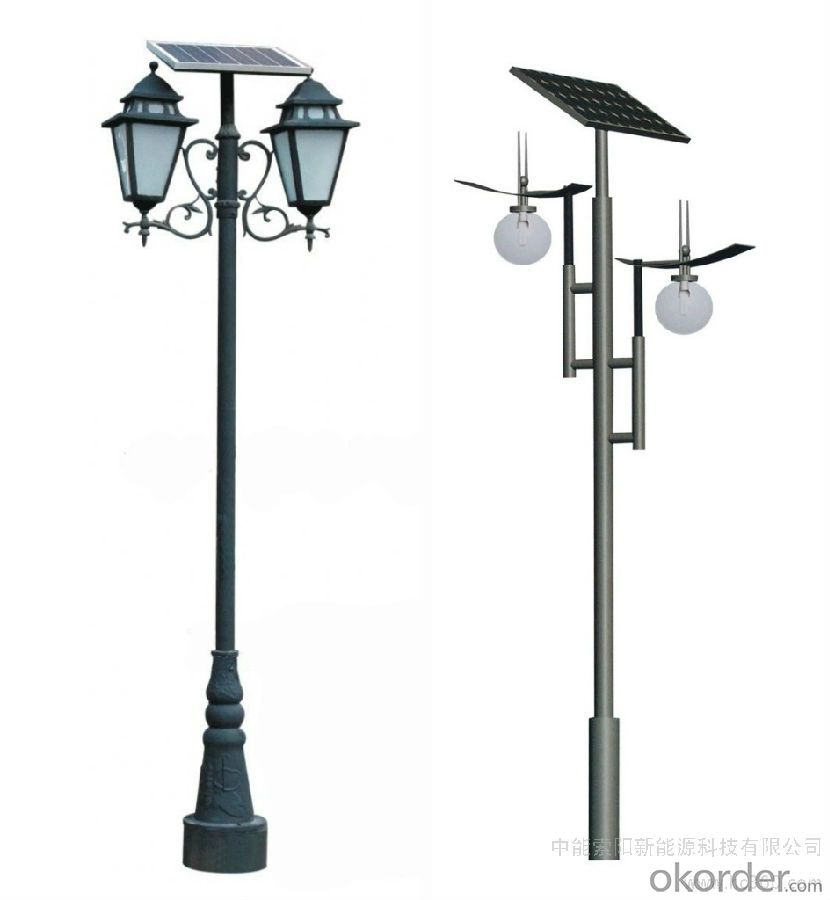
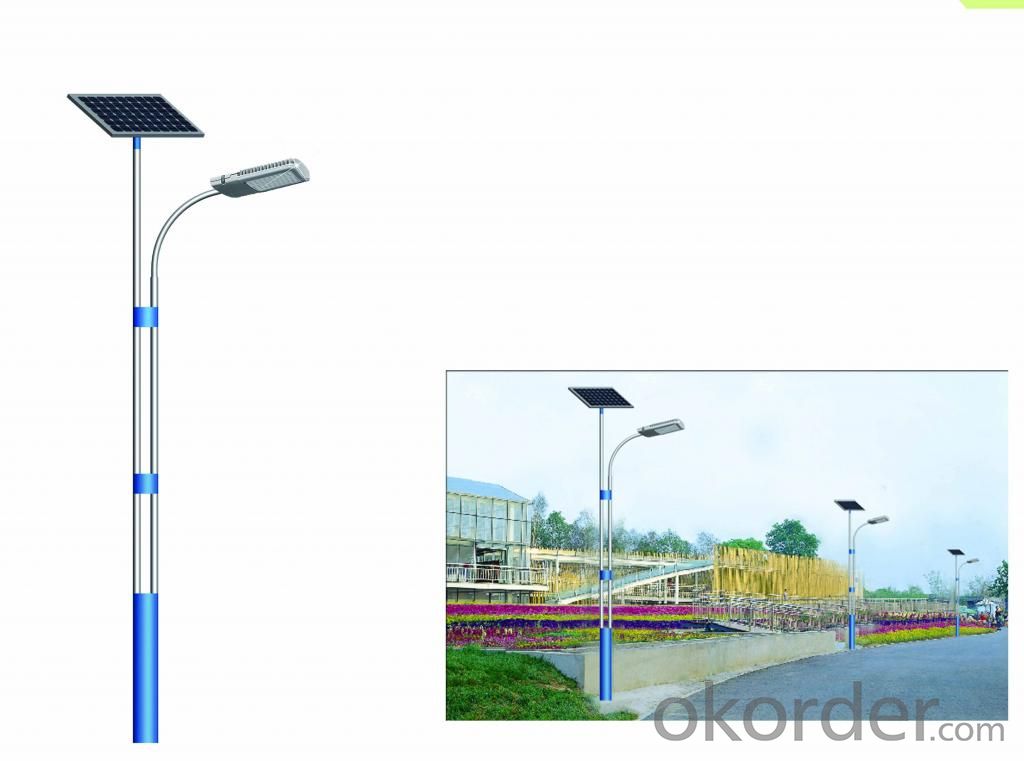
Step 3 – Determine the lighting requirements
How much lighting is needed on the street? Do the lights need to be dark sky compliant? Do the street lights need to run from dusk to dawn or for only a specified number of hours at night? Are the street lights able to dim in the middle of the night and still provide enough lighting? These questions need to be answered before you can decide on how many lights you will need to complete the project.
Step 4 – Find all alternatives
Solar power street lights are an option to traditional electrical lights. Solar street lights do not need the electrical grid to be brought in as they are self-contained units that provide their own electricThe best lighting solution by using lower amounts of power, better optics, dimming features where needed, and cost less in an overall solution.
Step 5 – Contact companies for quotes
The last step after gathering the above information is to contact companies for quotes. Just like with anything else, get multiple quotes and weigh the pros and cons of every company and situation. The lowest quote is not always the best, so make sure to do your research on companies and products before you submit a purchase order.
If you take your time, do your research, and gather needed requirements, your next street lighting project will be a success. Never be afraid to ask a lot questions, they may save you time and money in the long run.
- Q: Are there solar lights for outdoor campgrounds or RV parks?
- Yes, there are solar lights specifically designed for outdoor campgrounds and RV parks. These lights are equipped with solar panels that harness sunlight to charge their batteries during the day, allowing them to provide illumination throughout the night without the need for electricity. They are a popular and eco-friendly lighting solution for outdoor spaces.
- Q: What are the advantages of solar led street light?
- Dispersion: reach the Earth's surface of the total amount of solar radiation despite the large, but the energy density is very low. On average, near the Tropic of Cancer, in the case of sunny weather in summer, the irradiance of solar radiation at noon is the largest, and the average solar energy received in the area of ??1 square meter perpendicular to the sun is about 1,000W. Year and night average, only about 200W.
- Q: Are solar lights suitable for lighting up flagpoles at night?
- Yes, solar lights are suitable for lighting up flagpoles at night. They are a cost-effective and eco-friendly option as they harness solar energy during the day to power the lights at night. Solar lights can provide sufficient illumination to highlight the flag and ensure it is visible even in low light conditions.
- Q: Can solar lights be used on fences and walls?
- Yes, solar lights can be used on fences and walls.
- Q: Can solar lights be used for agricultural or farming purposes?
- Yes, solar lights can be used for agricultural or farming purposes. Solar lights are a sustainable and cost-effective solution for illuminating agricultural areas such as fields, barns, and livestock shelters. They can be used to provide lighting for various farming activities such as planting, harvesting, and taking care of livestock. Solar lights are powered by solar panels that convert sunlight into electricity, which is then stored in rechargeable batteries. This means that they do not require an external power source, making them ideal for remote areas or locations without access to electricity. Solar lights can be easily installed and require minimal maintenance, reducing the hassle and expenses associated with traditional lighting systems. In addition to providing illumination, solar lights can also have other benefits for agriculture. For example, some solar lights come with motion sensors that can detect movement and deter pests from entering the farming areas. This can help protect crops and livestock from potential damage. Furthermore, solar lights contribute to reducing carbon emissions and promote sustainability in agriculture. By harnessing the renewable energy of the sun, farmers can reduce their reliance on fossil fuels and contribute to a greener and more environmentally friendly farming practice. Overall, solar lights are a versatile and practical option for agricultural and farming purposes. They offer reliable and efficient lighting solutions, while also providing numerous environmental benefits.
- Q: Can solar lights be used for lighting up outdoor carports or garages?
- Yes, solar lights can be used for lighting up outdoor carports or garages. Solar lights are a great option for providing lighting in these areas as they are easy to install, require minimal maintenance, and do not require any electrical wiring. They harness energy from the sun during the day and store it in batteries, which powers the lights during the night. This makes them a cost-effective and environmentally friendly solution for outdoor lighting in carports or garages.
- Q: Are solar lights suitable for rooftop gardens or urban farming?
- Rooftop gardens and urban farming can definitely benefit from the use of solar lights. In fact, they can be an excellent lighting solution for these areas. One of the main advantages of solar lights is that they don't need external electricity. They rely on the sun's power, making them a sustainable and eco-friendly option. This is especially important in rooftop gardens and urban farming, where access to electrical outlets may be limited or installing traditional lighting systems may not be feasible. Furthermore, solar lights are easy to install and maintain. They usually come with stakes or clamps that allow for easy attachment to fences, walls, or other structures. Additionally, they don't require any wiring, eliminating the need for complicated installation processes. Moreover, solar lights can provide sufficient illumination for these spaces. While they may not be as bright as electric lights, many solar lights are designed with efficient LED technology that can adequately light up pathways, garden beds, or other features in rooftop gardens or urban farming environments. Another benefit of solar lights is that they contribute to a more sustainable and energy-efficient operation. By using solar lights, you can reduce your reliance on traditional energy sources, resulting in cost savings and conservation of natural resources. Additionally, solar lights often have built-in light sensors that automatically turn them on at dusk and off at dawn, ensuring that they only provide illumination when necessary. In conclusion, solar lights are a practical and suitable lighting solution for rooftop gardens and urban farming. They offer sustainability, easy installation, low maintenance, and adequate illumination, making them an ideal choice for these types of spaces.
- Q: How do solar lights handle saltwater environments?
- Solar lights are generally designed to withstand various environmental conditions, including saltwater environments. The materials used in the construction of solar lights are often resistant to corrosion caused by saltwater. This ensures that the lights can effectively operate and last longer in coastal or marine areas. One of the key factors that determine how solar lights handle saltwater environments is the quality of their components. High-quality solar lights are typically made with durable materials such as stainless steel, aluminum, or corrosion-resistant plastics. These materials prevent the lights from corroding or deteriorating when exposed to saltwater. Furthermore, solar lights designed for saltwater environments may have additional protective coatings or seals to enhance their resistance to corrosion. These features help to prevent saltwater from penetrating into the internal components of the lights, ensuring their efficient functioning even in harsh coastal conditions. However, it is important to note that even with these protective measures, regular maintenance and cleaning are still necessary to keep solar lights in optimal condition. Rinsing them with fresh water periodically and removing any accumulated salt deposits will help extend their lifespan and maintain their performance. In conclusion, solar lights are generally well-equipped to handle saltwater environments. By using corrosion-resistant materials and incorporating additional protective measures, they can withstand the challenges posed by coastal or marine conditions.
- Q: How do solar lights perform in areas with high levels of air pollution?
- Solar lights are generally affected by high levels of air pollution as it can reduce the amount of sunlight reaching the solar panels and therefore decrease their performance. The presence of pollutants in the air can block or scatter the sunlight, leading to a decrease in the amount of energy captured and stored by the solar lights. Consequently, their overall efficiency may be compromised in areas with high air pollution.
- Q: Can solar lights be used for public parks?
- Indeed, public parks can certainly make use of solar lights. In fact, solar lights offer numerous advantages and are an excellent option for illuminating these spaces. To begin with, solar lights operate using solar energy, eliminating the need for electrical wiring or connection to the power grid. This makes them highly cost-effective and easy to install, without requiring extensive infrastructure changes. Moreover, solar lights are environmentally friendly as they rely on renewable energy sources, reducing carbon emissions and contributing to the fight against climate change. Additionally, solar lights are low maintenance. Once installed, they require minimal upkeep and have a long lifespan, resulting in savings on maintenance and replacement expenses in the long term. They also have built-in sensors that automatically activate at dusk and deactivate at dawn, ensuring efficient energy usage and providing consistent illumination throughout the night. In terms of functionality, solar lights for public parks come in a range of designs and sizes, making them versatile and suitable for various applications. Whether it's path lighting, accent lighting, or even security lighting, solar lights can be customized to meet the specific needs and aesthetics of the park. Finally, solar lights enhance safety and security in public parks. Well-lit areas discourage illicit activities and create a sense of security for park visitors, encouraging more frequent and extended park usage. This, in turn, benefits the community by promoting outdoor activities, fostering social interaction, and encouraging a healthier lifestyle. Overall, solar lights offer a sustainable, cost-effective, and efficient lighting solution for public parks. Their environmental benefits, low maintenance requirements, versatility, and safety enhancements make them an ideal choice for illuminating and enhancing the beauty of public spaces.
Send your message to us
Flag Pole Kit With Solar Light - Solar Street Lamps Solar Street Light Top Class Quality and High Frequency
- Loading Port:
- Ningbo
- Payment Terms:
- TT OR LC
- Min Order Qty:
- 1 set
- Supply Capability:
- 5000 set/month
OKorder Service Pledge
OKorder Financial Service
Similar products
Hot products
Hot Searches
Related keywords
